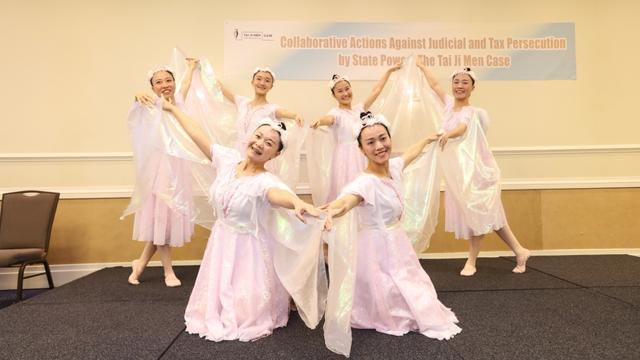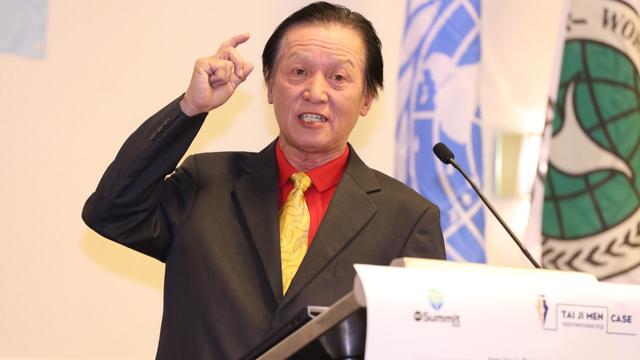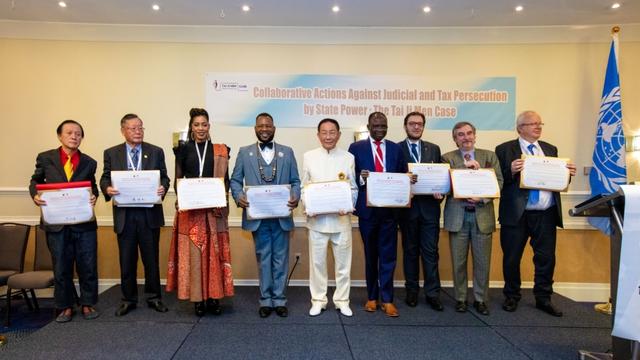A breakout session of the world’s largest freedom of religion or belief event discussed the Tai Ji Men case and the “Declaration of the International Day Against Judicial and Tax Persecution by State Power.”
by Daniela Bovolenta

On January 31 and February 1, 2023, the third International Religious Freedom (IRF) Summit in Washington DC has been the largest gathering of religious liberty activists of the year, co-chaired by Sam Brownback, former U.S. Ambassador-at-large for International Religious Freedom, and Katrina Lantos Swett, president of the Lantos Foundation for Human Rights.
On February 1, a breakout session at the Washington Hilton has been devoted to “Collaborative Action Against Judicial and Tax Persecution by State Power: The Tai Ji Men Case.” Gill Wang, who has been a Tai Ji Men dizi (disciple) since the age of seven, introduced the first part of the event and the movie “Who Stole Their Youth? The Tai Ji Men Case in Taiwan,” directed by Massimo Introvigne, who presents the essential facts of the case. Two songs followed, one sung live by Tai Ji Men volunteers present in Washington DC and one in a video presenting “the truth about the Tai Ji Men case” in musical form.

Wang then introduced Dr. Hong Tao-Tze, the Shifu (Grand Master) of Tai Ji Men, who presented the “Declaration of the International Day Against Judicial and Tax Persecution by State Power.” Wang reminded the audience that the proposal of instituting this new United Nations day of observance was launched on December 19, 2022, during a hybrid seminar in Pasadena held on the 26th anniversary of the raid in Taiwan that started the Tai Ji Men case on December 19, 1996. While the date refers to the Tai Ji Men case, Wang explained, the International Day will be devoted to all those whose human rights are violated by states through ill-founded legal and tax actions throughout the world.

Dr. Hong noted that human rights are rooted in nature, and in “the human reverence for the mystical power of nature, the universe, and divine beings.” As such, they should be universally recognized, but unfortunately such is not the case. “Unscrupulous officials,” Hong said, abuse public power and the judicial system. In a high number of cases, this abuse is perpetrated through unjust taxes. For these reasons, Hong concluded, the new International Day is needed, to protect democracy and justice and to help like-minded human rights defenders to march together towards a world where freedom of religion or belief and other fundamental rights will be granted to all.
Alan Hung, another young Tai Ji Men dizi, then called the speakers of the event present in Washington DC to solemnly sign the Declaration, and introduced a video where Massimo Introvigne, an Italian sociologist who serves as editor-in-chief of Bitter Winter, explains why the Tai Ji Men case is really about freedom of religion or belief, not only and not even mostly about the tax problems of some specific citizens or their money.

Hung then passed the podium to Marco Respinti, Bitter Winter’s director-in-charge. Respinti celebrated Dr. Hong as an internationally known symbol of resistance to judicial and tax persecution, and emphasized the two themes mentioned in the title of the event. One is the Tai Ji Men case, which he called “a staggering case of persecution.” Another is the concept of “collaborative action,” which Tai Ji Men has developed by cooperating with activists and scholars from all continents, including through the three IRF Summits.

Respinti then introduced several scholars who, within the time limits of the event, presented their reflections on judicial and tax persecution by state power as an international problem, and the Tai Ji Men case. Hugues Sanon, a Haiti-born Christian minister and Special Envoy of International Relations to the United Nations for the NGO Council of Justice, Equality and Peace, noted that despite the fact that six out of eight billions of humans living on Planet Earth define themselves as believers in one of the more than 10,000 existing religions or spiritual paths, some states, including some that can be called democratic, still discriminate against religious or spiritual groups they do not like.
Sanon noted that this is against the Universal Declaration of Human Rights and other international covenants. The Tai Ji Men case, which is not solved after more than 26 years, is an egregious example of these unjust and illegal discriminations, Sanon said. He publicly offered his solidarity to the Shifu and dizi of Tai Ji Men.

Alessandro Amicarelli, a London-based human rights attorney and the president of the European Federation for Freedom of Belief (FOB), shared the story of how he had first heard of the Tai Ji Men case from Massimo Introvigne. He was so shocked by the idea that somebody in the 20th century could have been accused of raising goblins that he decided to speak out publicly in favor of Tai Ji Men.
He praised the speech of You Si-kun, the speaker of Taiwan’s Parliament (Legislative Yuan), at the IRF Summit, and reported he had approached him urging Taiwan to demonstrate its commitment to freedom of religion by solving the Tai Ji Men case. Amicarelli concluded that he had been pleased to see “a tsunami of love” among religious liberty activists supporting Tai Ji Men, and expressed the hope that this global solidarity would help solving the case.

Stephen Enada, a Baptist Pastor based in Jonesboro, Georgia, and the president and co-founder of the International Committee on Nigeria (ICON), told how he has participated in several webinars about the Tai Ji Men case, for which he has a special feeling as he is himself part of a persecuted minority, Nigerian Christians. He noted the importance for Taiwan of American political support, and invited the dizi and their friends to take advantage of this circumstance by educating the U.S. representatives and senators on the Tai Ji Men case.
Lien Fu-Long, Taiwan Contact Professor at the University of Osnabrück, in Germany, said that Martial Law was abolished in 1989 in Taiwan but the Tai Ji Men case demonstrates that a “tax martial law” is still in force there. Lien compared the Chinese notion of Tao with the Western notion of Logos, and Immanuel Kant’s teachings on conscience with those of Confucius.
Tai Ji Men’s teachings on Tao and conscience, Lien argued, prove that their spiritual path is rooted in the “original Chinese religion” and spreads its principles throughout the world. Lien reported that he participated in attempts to ask various ministries and governmental bodies to solve the Tai Ji Men case, based on the century-old Chinese tradition of expressing grievances through petitions, only to discover that nobody among the Taiwanese bureaucrats seemed to be interested in hearing what he and others had to say.

Peter Zoehrer, an Austrian journalist and the executive director of FOREF (Forum for Religious Freedom Europe) described his efforts to create a network of journalists interested in freedom of religion or belief, and in reacting against the bad habit of the media of slandering religious and spiritual minorities they regard as an unpopular “soft target.” He mentioned cases in several countries, including Russia, Hungary, Romania, and Japan, where the media played a negative role in supporting the discrimination of religious movements labeled as “cults,” and other cases such as Nigeria where bloody persecution that made tens of thousands of victims was largely ignored by international media.
Zoehrer mentioned the Tai Ji Men case as a textbook example—but not the only one internationally—of how prosecutors determined to crack down on spiritual minorities they or their governments do not like enlist the help of the media to justify their persecution through slander.

Huang Kun-Kuang, a retired officer of Taiwan’s National Taxation Bureau, mentioned that income tax was first introduced in the United Kingdom in 1799, and almost immediately tax bureaucrats had the temptation to invent a false income where none existed and tax it. In the case of religious and spiritual groups, including Tai Ji Men, gifts given to their leaders are not income, as Taiwan’s Supreme Court recognized but the National Taxation Bureau refused to accept.
The problem, however, Huang said, goes beyond spiritual groups. He mentioned other cases in Taiwan where income was invented to apply unjust tax bills. Some of them were resolved by courts of law that declared such tax bills illegal. This also happened with the tax bills issued against Tai Ji Men. However, due to a technicality, one of them stood, although it was just as illegal as the others, and led to the auction and confiscation of sacred lands intended for a Tai Ji Men’s self-cultivation center.
Linda Chen, a post-doctorate research associate at Dalhousie University in Canada, and a Tai Ji Men dizi herself, concluded the event by summarizing the main features of the Tai Ji Men case. She called it an exemplary case for all communities throughout the world suffering because of legal and tax abuse by state power. It is precisely by reflecting on the Tai Mi Men case, Chen said, that we can all understand why it is important to endorse and support the “Declaration of the International Day Against Judicial and Tax Persecution by State Power.”

As a researcher specialized in genetic heart diseases, Chen knows that the heart can only work properly if all his cells work in unison in a synchronized fashion. Endorsing the Declaration would signal our willingness to work in unison with others to make the heart of justice, freedom of religion or belief, and peace beat healthily.
Source: Bitter Winter

